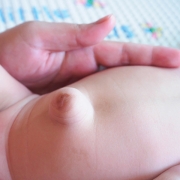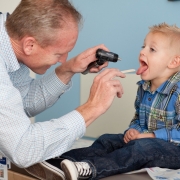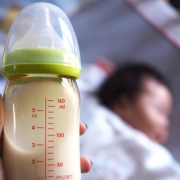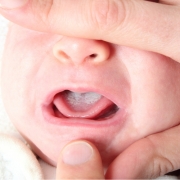
Umbilical hernias are very common and cause the umbilical area to push outward, especially when a baby cries. Hernias like this occur because of a temporary hole or weakness in the muscular part of the abdominal wall. These hernias nearly always self-resolve in the first 12-18 months. Do not follow advice to tape the area … Continue reading “Umbilical Hernias”

While our parents were advised to clean our umbilical cords with alcohol or hydrogen peroxide, we now know that all your baby needs is to have the cord kept clean and dry. Sponge bathe your baby rather than submerging the cord in water. Keep the diaper rim folded below the umbilical cord to prevent urine … Continue reading “Umbilical Cord Care”

Wellness visits are often called preventive visits, well-child visits, or well-child checks. These visits: help assess your child’s growth and development provide opportunities for questions and discussion At these visits, your pediatrician will work with you to prevent developmental and health issues before they start, and provide immunizations to protect your child from serious preventable … Continue reading “Wellness Visit Schedule”

Breastmilk and properly mixed formula contain the perfect amount of water for your baby. Additional water is unnecessary and can be dangerous. As your baby advances to taking other foods, small amounts of water can be offered. Discuss this with your pediatrician at well-visits. When using water to mix formula, follow instructions on the can. … Continue reading “Water”

Vomiting and spitting up are different. Newborn vomiting consists of a large amount of milk forcefully expelled at one time by mouth and it is frequently due to overfeeding. Spitting up consists of small amounts of milk which the baby regurgitates between feedings. Spitting up is of no concern if your baby is growing well, … Continue reading “Vomiting and Spitting Up”

Infants should receive a vitamin K injection shortly after birth. Vitamin K is essential for blood clotting. Vitamin K drops to ineffective levels in newborns within a few days. This can lead to bleeding problems including catastrophic bleeding in the brain. The only effective way to give vitamin K is by injection. Read More: HealthyChildren.org

Breastfed infants should receive 400 IU a day of supplemental vitamin D beginning in the first few days of life and continuing for at least 4-5 months. Formula fed infants should also be supplemented with 400 IU a day of vitamin D until they are taking more than 32 ounces of formula per day. Read … Continue reading “Vitamin D”

Thrush is a common infection of the mouth and tongue caused by yeast. An infant with this infection will have white patches on the inside of the lips and cheeks which will not rub off. Untreated thrush can lead to a severe diaper rash caused by the same yeast or yeast infection of mom’s nipples … Continue reading “Thrush”

Do not put infants in direct sunlight. Due to their relatively thinner skin, infants under 6 months should be covered to avoid direct sun exposure. Dress your infant in: lightweight long pants long-sleeved shirts brimmed hats that shade the neck When adequate clothing and shade are not available, parents can apply a minimal amount of … Continue reading “Sun Exposure”

In the first few months of life, children will experience periods of fussiness and crying, especially during the afternoon and evening hours. These periods often increase in length and intensity over the first six weeks of life, and then gradually decrease in intensity, usually disappearing by four months of age. Sometimes parents become anxious about … Continue reading “Soothing a Fussy or Colicky Child”